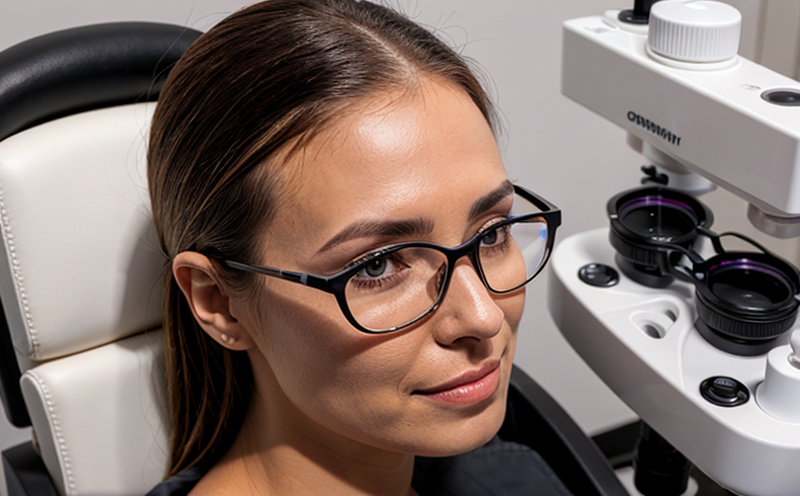ISO 10993 Irritation and Sensitization Support for Periocular Contact Materials
The ISO 10993 standard is a cornerstone in the medical device industry, providing guidelines for biocompatibility testing to ensure safety before market release. One crucial aspect of this standard involves irritation and sensitization assessments specifically tailored for periocular contact materials—those that come into direct contact with ocular surfaces.
Periocular devices encompass a wide array of ophthalmic products designed for use in or around the eye, including but not limited to contact lenses, intraocular implants, and periocular patches. The testing process under ISO 10993 focuses on identifying potential adverse reactions that could affect patient safety during prolonged usage.
The irritation test evaluates whether a material causes inflammation when it comes into direct contact with the ocular surface for at least two hours. Sensitization, conversely, assesses the likelihood of an immune response after multiple exposures to the same substance over time. These tests are critical in ensuring that periocular devices do not induce harmful effects on the delicate tissues surrounding or within the eyes.
The testing protocol involves several stages, each designed to simulate real-world conditions as closely as possible. Specimens are prepared according to detailed ISO 10993 specifications, which dictate how materials should be cut and stored prior to testing. For irritation tests, samples come into contact with rabbit corneas for a specified duration; sensitization tests require multiple applications over days.
Instrumentation plays a vital role in these assessments. High-resolution imaging equipment is used to monitor any changes in the ocular surface post-exposure. Additionally, histopathological analysis may be conducted on excised tissue samples to assess cellular damage and inflammatory responses.
In terms of acceptance criteria, ISO 10993 stipulates that no significant irritation or sensitization should occur based on predefined thresholds for inflammation scores. This ensures that only safe materials proceed through the development pipeline into clinical trials and eventually onto the market.
Our laboratory adheres strictly to these standards, ensuring accurate and reliable data collection throughout each stage of testing. By doing so, we provide clients with comprehensive reports that not only meet regulatory requirements but also offer valuable insights into potential risks associated with their products.
- Comprehensive Testing: We cover all stages from initial sample preparation to final analysis and reporting.
- Regulatory Compliance: Our tests align perfectly with ISO 10993 guidelines, ensuring compliance with international standards.
- Expertise: Our team comprises experienced professionals familiar with both the theoretical aspects of biocompatibility and practical application in real-world scenarios.
- Rapid Turnaround Times: We pride ourselves on delivering results quickly without compromising quality, allowing for timely adjustments if necessary during product development.
Applied Standards
The ISO 10993 series of standards encompasses various aspects of biocompatibility testing. For periocular contact materials, particular emphasis is placed on irritation and sensitization evaluations as outlined in:
- ISO 10993-10: Biological Evaluation of Medical Devices—Particular Requirements for Periocular Devices
- ISO 10993-11: Biological Evaluation of Medical Devices—Sensitization Potential in the Guinea Pig Maximization Test (GPMT)
The GPMT, specified in ISO 10993-11, is a key test for assessing sensitization potential. It involves multiple applications over several days and culminates in histopathological examination of the skin to determine whether there has been an immune response.
These standards provide robust frameworks for conducting thorough assessments that go beyond mere compliance; they ensure that products are safe not just initially but also when used repeatedly over extended periods. Our laboratory stays updated with all relevant amendments and interpretations issued by ISO, ensuring our services remain aligned with the latest industry practices.
Quality and Reliability Assurance
- Accurate Data Collection: We employ state-of-the-art equipment to capture precise measurements during testing, ensuring accurate data collection.
- Stringent Quality Control: Each batch of test materials undergoes rigorous quality checks before being used in any assessment.
- Detailed Reporting: Our reports provide not only the results but also detailed explanations and recommendations based on our findings.
- Consistent Results: By maintaining consistency across all tests, we ensure reliable outcomes that can be replicated if needed.
Competitive Advantage and Market Impact
Earning compliance with ISO 10993 standards offers numerous competitive advantages for pharmaceutical companies. Firstly, it enhances trust among consumers who seek assurance that their periocular devices are safe to use. Secondly, meeting these stringent requirements positions a company favorably in the eyes of regulatory bodies, potentially streamlining approval processes.
From an operational standpoint, adherence to ISO standards fosters better internal practices and communication within R&D teams. This leads to more efficient product development cycles where potential issues are identified early on, saving time and resources later down the line.
In addition, successful completion of these tests contributes significantly towards building brand reputation and fostering customer loyalty. When patients feel secure knowing their healthcare providers use only rigorously tested products, it strengthens relationships between pharmaceutical firms and their customers.





